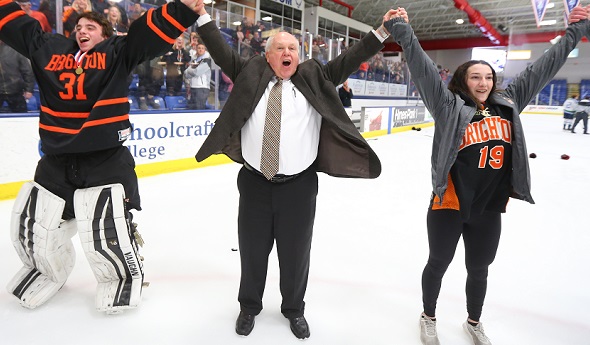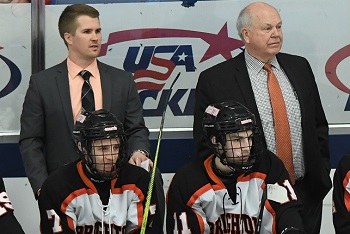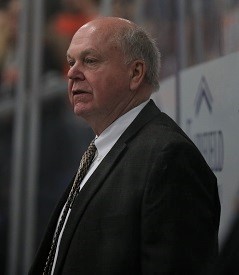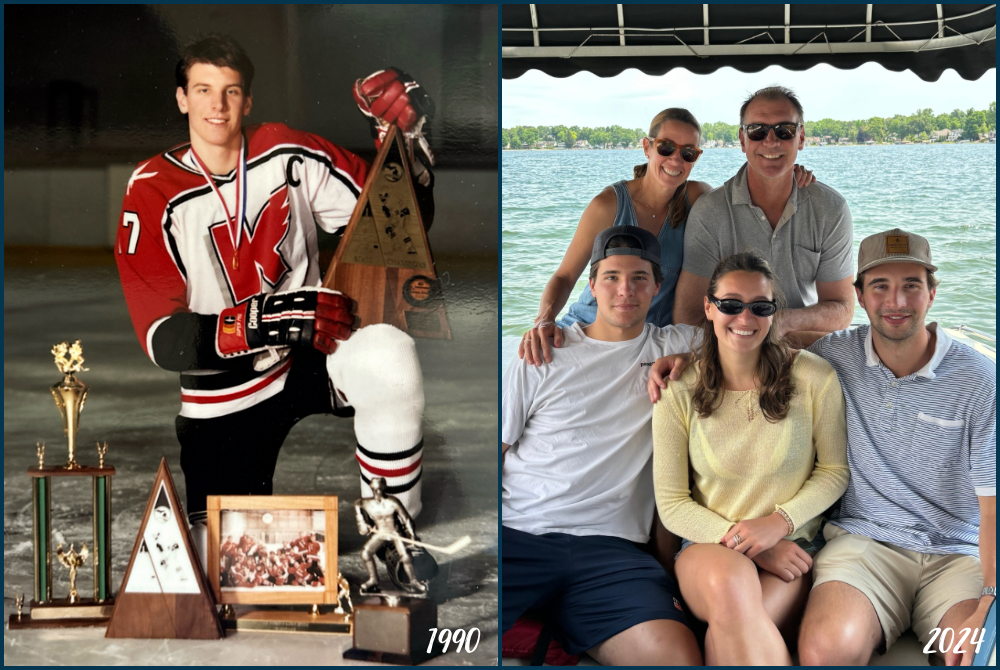
Brighton Coach's Impact 'Immeasurable'
By
Tim Robinson
Special for MHSAA.com
October 7, 2020
By Tim Robinson
Special for Second Half
Paul Moggach has never been much for looking back.
 And as he begins his first season away from the Brighton hockey program in more than three decades, he’s still looking ahead.
And as he begins his first season away from the Brighton hockey program in more than three decades, he’s still looking ahead.
“I’m thinking about what I’m going to miss more than the mark I left,” he said in a phone conversation last week. “I guess I enjoyed so much of the time I had, the opportunity to coach at Brighton, I’m thinking more how I fill the time and the things I'll miss.”
Moggach (pronounced MUG-uth) retired as Brighton’s coach this past summer after 25 seasons and having led five teams to MHSAA Division 1 championships. He compiled a record of 466-172-47 during that period.
But that’s not what he remembers most, nor why he wants people to remember him.
“I would like them to remember the teams and players who played for me and my assistants, more than me,” Moggach said. “We have so many blessings and opportunities in our lives, and hockey was one for me and hopefully for the players and assistants I worked with.”
One of those assistants was Kurt Kivisto, who joined the Bulldogs originally as a team manager more than 20 years ago and was a player at Brighton. He eventually won a national championship at Michigan State before rejoining the program as an assistant coach a decade ago.
“The No. 1 thing I’ll take from him is sticking by your beliefs and not sacrificing those beliefs for the team,” said Kivisto, who was named Moggach’s successor in September. “He sticks by those beliefs and ... he’s not willing to sacrifice that even if it could hurt the team. The character and integrity he has, how he treats people with fairness and what he believes is right is the biggest thing I’ll take.”
A stepson, Damon Whitten, played for Moggach at Brighton and at MSU before becoming an assistant coach and eventually the head coach at Lake Superior State, where he is in his eighth season.
Asked about Moggach’s impact at Brighton, Whitten said, “I’m not sure you can measure it. Your mind goes to the hockey players who have come to Brighton, and that’s a big part. But I think it goes beyond that. The money they’ve raised over the years for different families in need, for example. He’s had a big impact, and the players he had were a big part of that, but it goes well beyond that, and he did it the right way. Thirty-plus years (in the program), and I’m not sure you can count more than a handful of times where he made a bad decision or handled things poorly. He did things the right way, every day, all of the time, and I think it’s why he was so successful for so long.”
 The team’s charitable works were mostly kept under the radar – Moggach’s reasoning being his players had been given much, it was their turn to give back, and he didn’t want people thinking they did those things for publicity.
The team’s charitable works were mostly kept under the radar – Moggach’s reasoning being his players had been given much, it was their turn to give back, and he didn’t want people thinking they did those things for publicity.
Moggach joined Rick Bourbonais as an assistant at Brighton in the mid-1980s, then switched roles with him for the 1996-97 season.
He realized Brighton’s potential in the 1992-93 season, when the Bulldogs upset perennial state power Trenton in the Class A Quarterfinals before losing to Detroit Catholic Central in a Semifinal.
“That, to me, said, at least in my mind, that we can do this,” Moggach said. “It’s not impossible.”
He slowly began to build the program, getting good players and a schedule that would challenge them.
“You get the players by building a good culture,” he said. “Back in the day, when I started, we weren’t very disciplined and our league wasn’t very disciplined. So I think we realized we had to build that, and I could have an influence on building that in Brighton.”
Along with the culture, Moggach looked for an edge whenever he could find it. He was talked into making a trip to the Keweenaw Peninsula by one of his player’s parents, and found enormous benefits for his team, both competitively and in team bonding.
“It’s a lot about the little things we do,” he said, “that we find joy in, and create those opportunities. Creating the little moments really can build to bigger moments. We played capture the flag one day in about two feet of snow.
“Almost killed them,” he added, chuckling. The exhausted players didn’t have much left for the game that night, but spending time together for four days in a bus and hotel room always brought the team closer on and off the ice.
That first UP expedition also led to more teams making the trip, for team bonding and a glimpse of a part of the state, and themselves, they might never have seen otherwise.
“We didn’t do that for long,” he said. “But we always came back saying we were better together because of that experience.”
Bob Nelson had three sons play for Moggach, and Nelson’s wife, Kris, was president of the team’s booster club during their involvement over nearly a decade in Brighton hockey. Nelson also coached the program’s younger players for five seasons.
“We got to know the Moggachs really well,” he said. “It was a good experience, both as a coach and as a parent as well.”
Moggach introduced other things, including an emphasis on nutrition and off-ice training, that players resisted at first until they saw the benefits.
 He savored conversations with referees and opposing coaches before the games and even the occasional reporter after games.
He savored conversations with referees and opposing coaches before the games and even the occasional reporter after games.
But his first priority was the players. At times he would erupt in practice at a player or, more commonly, the team, and the boys soon learned to hear the message, not the volume. But for a couple of seasons, they also wrote some of his wilder statements down in a notebook after practice.
One year, they read some of them at the banquet, and after each one, Moggach’s wife, Sharon, would look at him and ask, “Did you really say that?”
Moggach would laugh and confess to remembering he had actually done so, then laughing.
“He knew part of what made the program good was his relationship to the players,” Nelson said. “If it was a good time, he wanted to enjoy it, even at his own expense at times.”
Moggach has staying in the background this offseason, letting Kivisto shape the team.
Asked if he were willing to fully switch coaching roles, as he and Bourbonais did a quarter-century ago, Moggach laughed.
“No,” he said emphatically. “Rick wasn’t in his 70s when we made the switch. Kurt needs his time. I’ll be there if he needs me.”
Moggach, who is 74, still works fulltime as the University of Michigan’s director of risk management.
He plans to spend more time with his wife and watch his grandsons play hockey, as well as catching some Lake Superior State games.
“I was really blessed to have Rick and Brownie (longtime assistant Mike Brown) along for the ride, and then to get Kurt involved,” Moggach said. “They weren’t the only ones, but they were the kids for me.
“The other thing is the support from the Brighton (High School) administration, the teachers, and our community. There are more people to thank than I could ever bring up. I do think that, all together, it was a great run. It couldn’t have been any better.”
PHOTOS: (Top) Recently-retired Brighton hockey coach Paul Moggach celebrates the 2018 Division 1 championship game win over Saginaw Heritage at USA Hockey Arena. (Middle) Former player Kurt Kivisto, left of Moggach during the 2018 Semifinal win over Detroit Catholic Central, served as an assistant before assuming the head coaching job in September. (Below) Brighton's 2018 championship was its fifth under Moggach. (Photos by Hockey Weekly Action Photos.)

East Kentwood Run Part of Memorable Start on Knuble's Way to NHL, Olympics
By
Dean Holzwarth
Special for MHSAA.com
July 24, 2024
KENTWOOD – It’s been more than 30 years since the 1990 Class A championship hockey game was played in Flint.
 However, Mike Knuble still recalls vividly a key moment that helped East Kentwood upset favored Trenton.
However, Mike Knuble still recalls vividly a key moment that helped East Kentwood upset favored Trenton.
“One of our players scored on a fluky bounce with about seven or eight minutes left,” said Knuble, who recorded a hat trick in the 5-4 victory. “(Trenton) threw everything at us after that, and somehow we held them off and they weren’t able to score. Our goalie had a heck of a game, and it happened to be our night.”
The state title was the program’s first. It also marked the final game of a remarkable high school career for Knuble, who would eventually go on to have a lengthy career in the NHL.
The Falcons had lost in the 1989 Semifinals to Flint Powers Catholic, which helped fuel their run to the championship game the following season.
“We felt we should be there as a team,” said the 52-year-old Knuble, who tallied an eye-popping 103 points (63 goals/40 assists) his senior year.
“We got by Flint Powers, and the question was if we could win the final game. Trenton had a nice program for a number of years, and a lot of history. We wanted to keep it close and then hang on.”
The emergence of the East Kentwood hockey program, guided by legendary coach Ron Baum, was a community initiative.
“We had a real grassroots effort in the 80s to get a youth program started, and that filtered to the high school,” said Knuble. “We built the rink by hand, and I remember hauling hoses into the building for the sand flooring. It was a unique time in Kentwood with the amount of focus on the program and buy-in from the community.
“It was a real nice high school to play for in the late 80s and early 90s, and we always had competitive teams and nice players. We played a lot of hockey when we were younger.”
In 1991, Knuble was drafted by the Detroit Red Wings in the fourth round, 76th overall, and played the next four seasons at University of Michigan.
He earned Central Collegiate Hockey Association second-team honors twice and was named an NCAA West All-American in 1995.
“I was pretty raw so I had to develop my skills as a player, and someone in the Red Wings organization identified some potential in me,” Knuble said. “It’s one thing to be drafted and another thing to sign a pro contract, so the good thing was Michigan gave me a longer runway to develop as a player on and off the ice. It gave me extra time to get my game in order in the right environment under a great coach.”
Knuble made his NHL debut on March 26,1997, against the Colorado Avalanche. He played nine games, but not during the playoffs as the Red Wings went on to win their first Stanley Cup championship since 1955.
Knuble made the roster the following year and was a part of Detroit’s 1998 team that won the Stanley Cup for the second straight season.
“I didn't have a huge hand in it; the players that were there really drove that bus, and we were younger guys,” Knuble said. “We had a lot of fun and enjoyed ourselves, but at the end of the day you know who really won things and it was a great experience as a young player.
“You learn what it takes to be a pro, you watch how guys operate and how a winning team works. Everyone accepted their roles.”
Knuble, who resides in the Grand Rapids area, would ultimately play 16 seasons in the NHL with Detroit, the New York Rangers, Boston Bruins and Philadelphia Flyers.
He played in 1,068 games and scored 278 goals along with 270 assists.
“As a player you go through cycles,” Knuble said. “Your first step is to get a foothold in the league and try to get in the league, and the second one is to stay there.
“And the third one is to be an everyday guy, and then fourth is to sign repeat contracts and play for as long as you can. And then you become one of the old guys. When I was younger I saw players who had their kids in the room, and I said that I wanted to play as long as that guy. I wanted to do that, and it means you've played for a long time.”
Knuble also was a member of the 2006 U.S. Olympic Team and won four world championships with Team USA.
“It’s a year-to-year, day-to-day business in pro sports, and it can go south at any time, but I got a lot out of it and had some great experiences,” Knuble said. ”I played in a lot of great cities, met a lot of great people and played a ton of games. It was a really good run, and we had kids and they were old enough to remember stuff and experience that, too.
“I played until I was 40, and if you are going to play until you're 40, you really don't have a lot to complain about.”
Knuble had been an assistant coach with the Grand Rapids Griffins for several years, but stepped away in order to spend time with his three children. He watches his two sons play collegiate hockey while also assisting a local youth hockey program.
Cam is in his fifth year at Western Michigan University, and Cole is beginning his second season at Notre Dame. Anna is a student at Michigan State University.
“I had two kids playing college and a daughter in the middle of college, so I learned to like my flexibility,” Knuble said. “I took last year off and now help with the Fox Motors program that has 15 and 16-year-olds. I’m staying in the game, just trying to help young players find their way and make decisions whether to play juniors or high school.”
After Knuble played his final season with the Flyers in 2012-13, he had the opportunity to coach both of his sons.
“That was really important to me,” he said. “I had many opportunities to work full time, but I wanted to be around to coach my sons and do the driving and take them places. To see where they could be as players. I played long enough where I could make a decision like that and take that route.”
Knuble is enjoying ‘the college life’ as he travels around supporting his children.
“We are seeing a lot of college campuses with tailgating and hockey games, and it’s been a lot of fun,” Knuble said. “Both have great hockey environments, and both are lucky to play in different types of programs. We’ve been very fortunate to have them play and go down to see them.
“That’s why I didn’t want to get locked into something fulltime where you wish you were watching them play versus what you’re doing.”
2024 Made In Michigan
July 22: Monroe High Memories Remain Rich for Michigan's 1987 Mr. Baseball - Read
July 17: Record-Setting Viney Gained Lifelong Confidence at Marine City - Read
July 11: High School 'Hoop Squad' Close to Heart as Hughes Continues Coaching Climb - Read
July 10: Nightingale Embarking on 1st Season as College Football Head Coach - Read
June 28: E-TC's Witt Bulldozing Path from Small Town to Football's Biggest Stage - Read
PHOTOS At left, East Kentwood’s Mike Knuble as a high school senior in 1990, and at right with his family. (Photos provided by Mike Knuble.)

